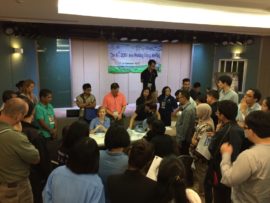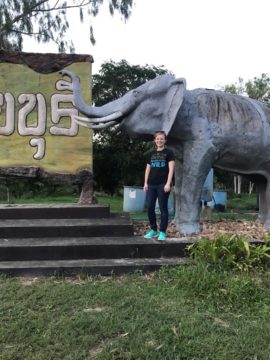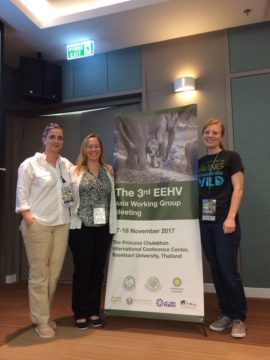Working Together to Save Elephants
By: Dr. Christine Molter

Elephant endotheliotropic herpes virus (EEHV) is a potentially deadly disease that not only affects elephants in human care, but also those living in the wild. Populations of wild Asian elephants are impacted by this disease in addition to threats like habitat fragmentation and poaching. To understand and combat this disease, veterinarians, researchers, conservationists, and elephant caretakers formed a collaborative team, called the EEHV Asia Working Group. The 3rd EEHV Asia Working Group meeting was hosted by Kasetsart University in Hua-Hin, Thailand. As part of the Houston Zoo’s on-going commitment to investigating EEHV and to save Asian Elephants in the wild, I was able to participate in this group.
Traveling to Hua-Hin is a long process. After more than 24 hours in flight from Houston, Texas to Tokyo, Japan to Bangkok, Thailand and 3-hour van ride, I finally made it to Hua-Hin. A total of 70 attendees from 12 countries made similar journeys to be at the meeting.
The two-day conference started with updates from those different countries and included India, Indonesia, Malaysia, Myanmar, Nepal, Singapore, Sri Lanka, Thailand, the United States, Vietnam, and a summary from all of Europe. Each representative shared their successes and unique EEHV challenges, with common themes of needing more regional laboratories with the ability to test samples for the virus, education for local people working with elephants about EEHV, increased availability of anti-viral medications for treatments, and further wild elephant research. To help address these challenges, discussions and brainstorming sessions took place and the group outlined strategic goals for EEHV efforts in Asia. In addition to defining goals, practical lectures and demonstrations also occurred. I taught elephant blood crossmatching, a necessary step prior to administering potentially life-saving plasma transfusions to elephant calves sick with EEHV, to ensure that the plasma donor and recipient are a good match.
At the end of the conference, an excursion to Kuiburi National Park was planned. We spotted two wild female Asian elephants with 3 calves between them. The sight of elephants in the wild was poignant, as it embodied the goal that everyone at the meeting is working towards together – to save elephants.

The Houston Zoo is a leader in global EEHV efforts. The protocol developed at the Houston Zoo, to monitor, diagnose, and treat this disease is utilized by people all over the world. It is humbling to hear directly from those working with elephants in range countries, that our Houston Zoo protocol provides important clinical guidelines for them. It is through our collective information sharing, research partnerships, global meeting participation, and local support that the mission of the Houston Zoo is achieved – to save animals in the wild.

Many thanks to all who work tirelessly for elephants and to those who diligently organized the EEHV Asia Working Group meeting, especially to Dr. Sonja Luz from Wildlife Reserves Singapore, Dr. Supaphen (Amm) Sripiboon from Kasetsart University, and Dr. Lauren Howard from San Diego Zoo Global for their leadership.
Efforts to combat EEHV are on-going and collaborative. More information about EEHV can be found at www.eehvinfo.org. Previous Houston Zoo blogs on the EEHV Asia Working Group can be found here.
